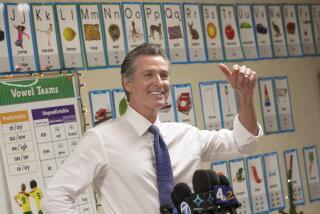Accountability in Education
- Share via
William Bradley does a great job of puncturing myths on both sides of the public education crisis (Commentary, May 19). Smaller classes will not alone cure our problems, and vouchers will forever destroy the opportunity for the vast majority of the poor to climb out of the lower classes. Unfortunately, he does not offer a solution to the problem. Allow me to do so. Our schools desperately need accountability; but to most people, accountability means that if the student does not perform, we should blame the teacher or the school system.
I would blame neither the teacher, nor the system, not even the parents, not even society. Who’s left? The student! In the ‘50s and early ‘60s, we began telling kids that their education was someone else’s responsibility. That if they weren’t learning (and loving it), probably the teacher wasn’t doing his or her job. This has led us to the current situation, in which students complain that school is “boring” and therefore they are entitled to ignore instruction, avoid assignments and skip classes.
We will get back to a successful educational system when students know that the only way they will receive a diploma is to be able to demonstrate the skills and knowledge society considers essential for an educated person.
BERNARD FEUERMAN
Winnetka
* I was interested to read that Gov. Pete Wilson is pressing for a new set of tests to be taken by all state schoolchildren (May 19). I would hope that the governor is also interested in student learning.
In the rush to test, the goal of finishing school with a high level of skills and abilities (and knowledge) is often forgotten. High standards and the tests to measure these standards are merely tools that guide us in creating educational systems that produce results. What is important are the results--not that we just measure them accurately.
MARTIN HITTELMAN
Professor of Mathematics
Los Angeles Valley College





